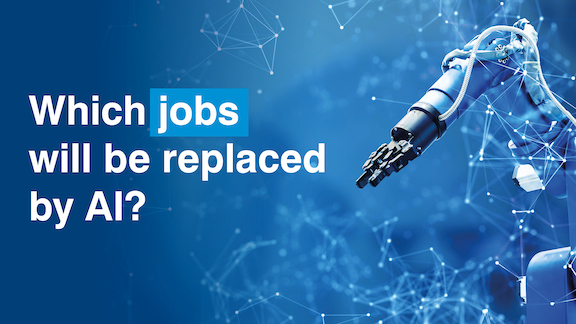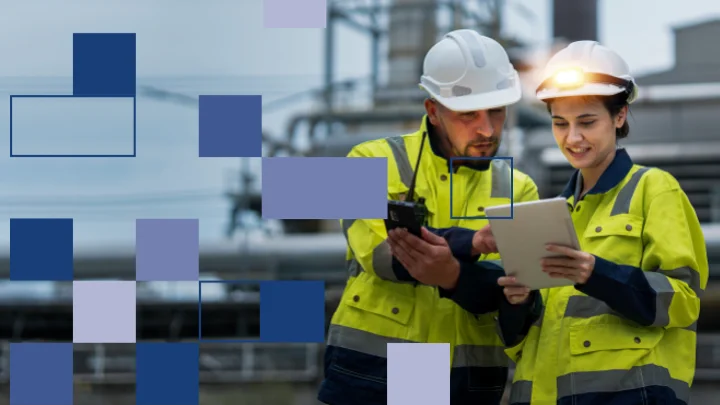How Will Artificial Intelligence (AI) Impact The Workplace?
08 Apr, 20246 Mins
How will artificial intelligence impact the workplace?
Novel writing, architecture and political analyses: these are just a handful of the tasks that ChatGPT, an artificial intelligence (AI) chatbot, has performed since the Open AI research laboratory launched it in November 2022.
Unlike humans, however, ChatGPT produced these in a matter of moments. With favourable productivity rates, AI is redefining the workplace – sparking a boom in new technology uptake to replace human work.
You might be wondering, therefore, how exactly AI will impact the job landscape? And, more specifically, will it impact your job in the oil and gas industry? Let’s find out how AI is predicted to effect oil and gas engineering jobs in the UK.
The big question: will AI replace jobs?
Ann Bordetsky, Partner at New Enterprise Associates, likens AI’s insurgence to the Industrial Revolution. Just as the factory line brought about greater efficiency to companies, so too does AI.
“AI won’t just boost efficiency for coding, marketing, legal or healthcare admin work — but entirely evolve how businesses and organisations of all types are built and run,” she tells Forbes Magazine.
AI could help employers achieve significant labour cost-savings – also bypassing major expenses associated with staffing a large workforce, such as office space, training programmes and wellness bundles.
Plus, if widely implemented, AI will impact up to two-thirds of current full-time jobs (300 million) globally, according to a recent Goldman Sachs study. The research included the analysis of traditional AI (think: data analysis, fraud detection, and pattern detection) and generative AI, which produces new content (e.g., designs and synthetic data). Generative AI alone could entirely substitute a quarter of the global workforce.
Which jobs will be replaced by AI?
AI will affect some jobs more than others. White-collar workers – people who hold office positions – are most at risk, including:
Administrative roles
AI is set to have a huge impact on administrative roles such as personal assistants and customer service providers. By 2027, expect a chatbot to receive one in four of your customer service enquiries thanks to increasing software sophistication speeding up the uptake of automation technology for these role types. In fact, in the US alone, automation threatens to make 46% of administrative roles redundant.
Judicial jobs
Another type of role expected to be impacted by AI are judicial jobs such as paralegals and legal assistants. Data used in legal cases, in which swathes of content are synthesised, are typically very structured, which makes judicial jobs, alongside administrative positions, some of the most exposed to automation.
Jobs in tech
Another industry which will feel the effects of AI are jobs in tech such as coders, data analysts, and software engineers. Because AI is faster and more accurate, organisations may increasingly rely on AI to execute the number-crunching required in many tech-related jobs today.
Media roles
New tools in generative AI continue to bolster the capability of software to read, write and understand text-based content, minimising the need for human contribution in this sector. Some media outlets, such as Buzzfeed and CNET, have already used platforms similar to ChatGPT to write numerous articles, quizzes and more, resulting in a significant impact for content creators, technical writers, and journalists..
Finance positions
financial advisors and analysts, accountants, market traders. Thanks to its ability to identify patterns such as market trends, AI will also put finance positions such as financial advisors, financial analysits, acountants, and market traders at risk. Utilising platforms that do this at lightning speed is invaluable for companies wishing to stay one step ahead of their competitors.
How will jobs change in the future?
However, while AI has the potential to perform a multitude of jobs well, there’s nothing quite like the human touch.
Compassion, for example, is rated higher than or equal to the deliverance of sound medical knowledge in US healthcare – by both doctors and patients. In fact, 85% of patients prioritise compassion over pricing even, according to a HealthTap study.
And, like humans, AI isn’t perfect. Software such as ChatGPT still fumbles – with typos, coding errors and basic maths miscalculations a common occurrence. That’s why Manav Raj, co-author of the Goldman Sachs study and Assistant Professor of Management at the Wharton School of the University of Pennsylvania, insists AI must be complementary to jobs.
"We have to think about these things as productivity enhancing tools, as opposed to complete replacements."
Integrating AI into the workplace, therefore, could actually help elevate existing job performance. Coders, for example, could use this technology to increase efficiency and identify potential errors.
As with all emerging industries, the widespread uptake of AI would also lead to the creation of new job types. Already, demand for prompt engineers, who write text instead of code for AI systems, has rocketed.
What does this mean for the oil and gas industry?
AI is already having a significant impact on the oil and gas industry by enabling businesses to make smarter and more efficient decisions, as well as improving productivity and safety.
AI provides benefits across the entire industry, from helping oil and gas companies to assess the value of reservoirs, customise drilling and completion plans, assess risks, enhance quality assurance, and reduce costs.
There are numerous use cases across every sector, such as:
Exploration
Armed with AI, the oil and gas industry can better understand reservoirs, minimise risk, make better decisions, and improve forecasting.
Drilling and completions
AI enables companies to improve everything from well design to drilling and completion execution, result in maximise resource recovery and increased ROI.
Production
AI and machine learning can also help with accurate well production forecasts for maximum lifetime well production, and also anticipate any issues in advance.
Transportation
Another impact of AI on the oil and gas industry is in terms of gathering and transportation by forecasting product flow, demand, and price, as well as improved planning and routing.
It’s time to face up to AI
So, in conclusion, while the lines of code for how AI will affect workplace roles are still being written, complete automation of work is unlikely. Instead, AI has the potential to enhance many job functions rather than replace them.
Rather than feeling threatened by its emergence in the oil and gas industry, our recommended approach is to get to know AI and its application to your role. This way, you can be ahead of the curve when it comes to including it in your workplace processes, which will secure your position for the long term.
Are you looking for your role of the future? Our expert team will be more than happy to help! View our full range of vacancies on our website to find your next UK oil and gas engineering job, or alternatively upload your CV here.



